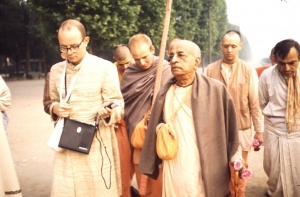CC Madhya 4.59: Difference between revisions
No edit summary |
(Vanibot #0054 edit - transform synonyms into clickable links, which search similar occurrences) |
||
| Line 17: | Line 17: | ||
<div class="synonyms"> | <div class="synonyms"> | ||
''tulasī'' | ''[//vanipedia.org/wiki/Special:VaniSearch?s=tulasī&tab=syno_o&ds=1 tulasī]'' — tulasī leaves; ''[//vanipedia.org/wiki/Special:VaniSearch?s=ādi&tab=syno_o&ds=1 ādi]'' — and others; ''[//vanipedia.org/wiki/Special:VaniSearch?s=puṣpa&tab=syno_o&ds=1 puṣpa]'' — flowers; ''[//vanipedia.org/wiki/Special:VaniSearch?s=vastra&tab=syno_o&ds=1 vastra]'' — garments; ''[//vanipedia.org/wiki/Special:VaniSearch?s=āila&tab=syno_o&ds=1 āila]'' — arrived; ''[//vanipedia.org/wiki/Special:VaniSearch?s=aneka&tab=syno_o&ds=1 aneka]'' — in great quantity; ''[//vanipedia.org/wiki/Special:VaniSearch?s=āpane&tab=syno_o&ds=1 āpane]'' — personally; ''[//vanipedia.org/wiki/Special:VaniSearch?s=mādhava&tab=syno_o&ds=1 mādhava]-[//vanipedia.org/wiki/Special:VaniSearch?s=purī&tab=syno_o&ds=1 purī]'' — Śrī Mādhavendra Purī; ''[//vanipedia.org/wiki/Special:VaniSearch?s=kaila&tab=syno_o&ds=1 kaila]'' — executed; ''[//vanipedia.org/wiki/Special:VaniSearch?s=abhiṣeka&tab=syno_o&ds=1 abhiṣeka]'' — the bathing of the Deity at the beginning of the installation ceremony. | ||
</div> | </div> | ||
Latest revision as of 23:31, 19 February 2024

A.C. Bhaktivedanta Swami Prabhupada
TEXT 59
- tulasī ādi, puṣpa, vastra āila aneka
- āpane mādhava-purī kaila abhiṣeka
SYNONYMS
tulasī — tulasī leaves; ādi — and others; puṣpa — flowers; vastra — garments; āila — arrived; aneka — in great quantity; āpane — personally; mādhava-purī — Śrī Mādhavendra Purī; kaila — executed; abhiṣeka — the bathing of the Deity at the beginning of the installation ceremony.
TRANSLATION
The villagers brought a large quantity of tulasī leaves, flowers, and various kinds of garments. Then Śrī Mādhavendra Purī personally began the abhiṣeka [bathing ceremony].
PURPORT
In the Hari-bhakti-vilāsa (sixth vilāsa, verse 30) it is stated that the Deity should be bathed in water mixed with yogurt and milk, accompanied by the sounds of conchshells, bells and other instruments and the chanting of the mantra oṁ bhagavate vāsudevāya namaḥ, as well as the chanting of the Brahma-saṁhitā verses beginning cintāmaṇi-prakara-sadmasu kalpa-vṛkṣa-lakṣāvṛteṣu surabhīr abhipālayantam (BS 5.29).